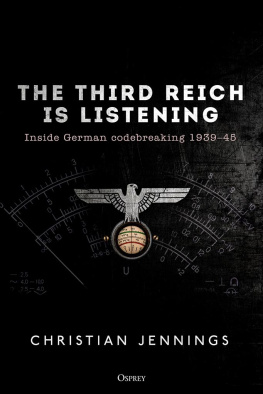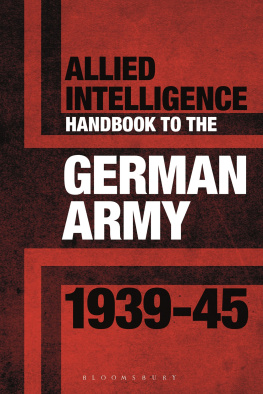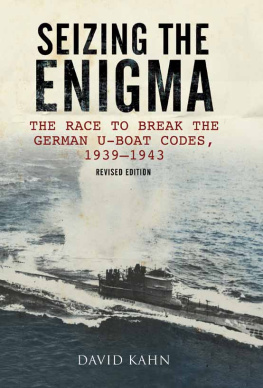

Five people more than any made this book possible: my literary agent Andrew Lownie in London, my editor Kate Moore in Madrid and Oxford, my brothers Anthony in Rome and James in Yangon, and in Turin the indomitable Kat Sacco. Thanks must go to Italy, too. There can be few places more conducive to happy writing than Finale Ligure on the Mediterranean, or Bardonecchia in the Italian Alps.
CONTENTS

PREFACE
The Files
Spring 1945, Berlin and Bavaria
By late March 1945, the Red Army had stormed into Danzig in Poland, and crossed the border into Austria. In the west the Allies had captured Cologne and moved over the Rhine. With Germany under attack from all sides, the British and Americans then slowed their advance to allow the Russians to take Berlin. A month earlier in February, nearly a thousand American B-17 Flying Fortresses had attacked the Berlin railway network in the mistaken belief that the German Sixth Panzer Army was crossing the city by rail en route to the Eastern Front. Allied intelligence proved to be incorrect, but the dense bombing caused a firestorm that lasted for four days, and burned everything in its path to ash. Because the raid took place in daylight, and American General Carl Spaatzs aircraft used few incendiary bombs, the casualty toll was light for a major raid. A total of 3,000 people died, 20,000 were wounded and 120,000 were made homeless. But it made the German capital an increasingly difficult and highly dangerous location in which to work.
The cipher bureau of the Wehrmacht High Command, called OKW-Chiffrierabteilung, or OKW-Chi for short, had in fact long departed Berlin. In the winter of 194344 aerial bombing had made it impossible to stay in the capital any longer. By the time the cryptanalysts left some of them had already been working in a series of deep cellars in a residential part of the city. There was no central heating, the doors had in some cases been removed for firewood, and in the rooms where the cryptographers worked a layer of white plaster dust covered everything, brought down by the repeated shocks of aerial bombing on the buildings above them. In that cold winter, some of the men and women worked wearing gloves or mittens against the cold, making it even harder to try to write signals decryption reports, in pencil, by flickering electric light and candles. At that point in the war, as 1943 turned into 1944, the British and American signals that OKW-Chis cryptanalysts were decoding were filled with details of the Allies steady northern advance up through Italy, their plans for a second front, and the Red Armys encirclement of the Germans at KorsunCherkassy. There were also decrypted reports about Allied air raids on Germany, becoming ever more frequent, as well as the glaring failure of Admiral Dnitzs U-boats to prevent Allied supply convoys, sometimes hundreds of ships strong, sailing across the Atlantic. While not imminent, the end of the Third Reich could be smelled in the air. But even so, Germanys codebreakers were still hard at work monitoring, intercepting, decoding and reading signals from agents, armies, aircraft and ships from different countries.
OKW-Chi was only one of the ten German signals intelligence agencies, but by July 1944, just after the invasion of Europe, it was working on cracking codes from enemy forces and neutral governments as well as foreign agents in forty-one different European and non-European countries. By March 1945, as the American bombers continued to pound Berlin, the agency was working from the Wehrmacht signals school at Halle, in the central part of eastern Germany. Wilhelm Fenner was the cryptographer and administrator in charge of the OKW-Chi codebreaking department, and by the end of that month, he decided that they had to evacuate and head south to Bavaria. So hundreds of kilograms of secret documents were loaded into wooden packing cases that had once contained radio interception equipment. A company of soldiers found trucks and petrol, and the staff emerged from underground into the grey, half-daylight of the city. Some of the staff were ordered to head for the railway. Others boarded the lorries, and only when they pulled out of Halles southern suburbs did the air begin to clear. None of the cryptanalysts and signals intelligence people on the trucks knew much about where they were going, or what would happen to them. They sat in the back of bumping lorries for hour after hour, the space between them and their colleagues opposite filled with the big, wooden cases. These were loaded with some of the most important intercept and decoding reports and files that OKW-Chi had worked on since 1938. Their superiors were determined that none of this would fall into the hands of the advancing British, Americans or Russians. And among the men and women on the lorries that day, both soldiers and civilians, there was a silent, urgent, mutual understanding that nobody, but nobody could be allowed to fall into the hands of the Red Army.
OKW-Chi burned all non-essential material, but that which was deemed too important to be destroyed was taken from the headquarters at Halle towards a lake in southern Bavaria. The meandering journey of the OKW-Chi team took nearly ten days. As they headed further south, so the weather got cautiously warmer. It was full spring by the time they arrived in Bavaria. By lorry and train, they moved southwards towards Nuremberg, Munich and Berchtesgaden, where Hitler had his Eagles Nest. Outside the town of Rosenheim, fifteen miles south of Munich, the convoy pulled off towards the mountains that loom on the Bavarian and Austrian border. By the beginning of the second week in April, the soldiers and civilians of OKW-Chi had billeted themselves in a series of deserted schools, hotels and railway buildings in a small Alpine town called Schliersee. It was set around a beautiful blue lake. One morning they saw SS men from an artillery unit dumping wagon loads of mortar and artillery shells into the water, and burning their paper files on the shore. The day after that some of the men from OKW-Chi and a few soldiers put the boxes full of their own secret files onto two railway wagons: these were shunted up the sidings by the lakes edge, and from it the men hurled dozens of boxes into the muddy water. Another group loaded boxes and pieces of technical equipment onto a raft, rowed out into the lake, and dumped the material into the water. The German soldiers and civilians then moved off towards Munich again: there were orders to join a combined army and air force unit that was being put together across Bavaria, made up of stragglers of all ranks and units. This would then surrender in an organized manner to the Allies, who were fast approaching from the west. Meanwhile the crates containing OKW-Chis records lay thirty feet down in the soft brown mud of a Bavarian lake, settling gently onto a layer of SS artillery shells.
In July 1944 the British and Americans decided to try to capture the scientific secrets of the Third Reich. The Allies were anxious to know what kind of technological advantages the Germans had achieved over them. How far advanced were they when it came to guided rockets, precision bombs, jet aircraft and main battle tanks? And which codes, from both Allied and neutral countries, had they broken? How? When? Using what equipment or inside information? In short, what was there in terms of technology and intelligence that the Germans had that the Allies didnt?
Next page












